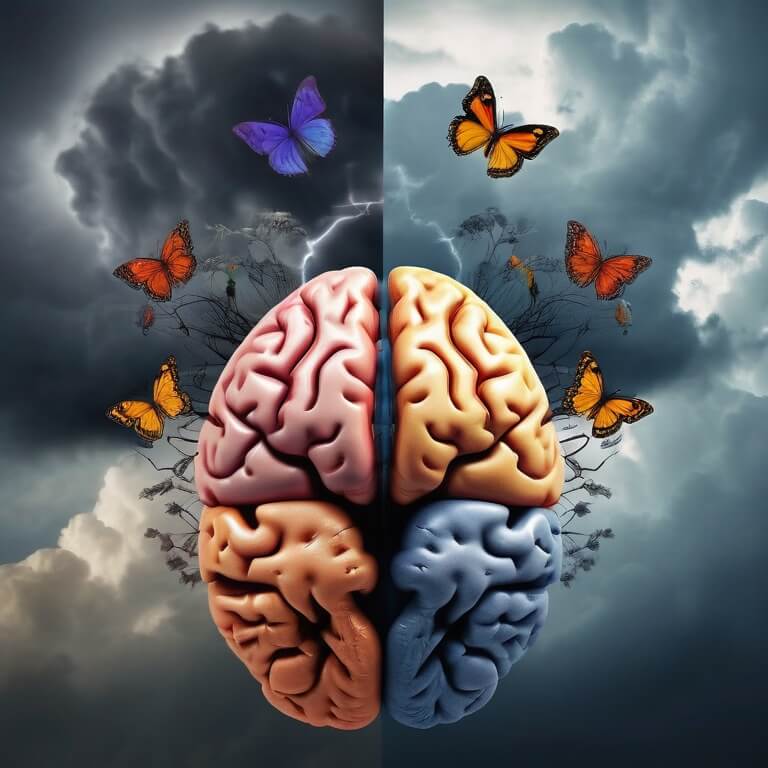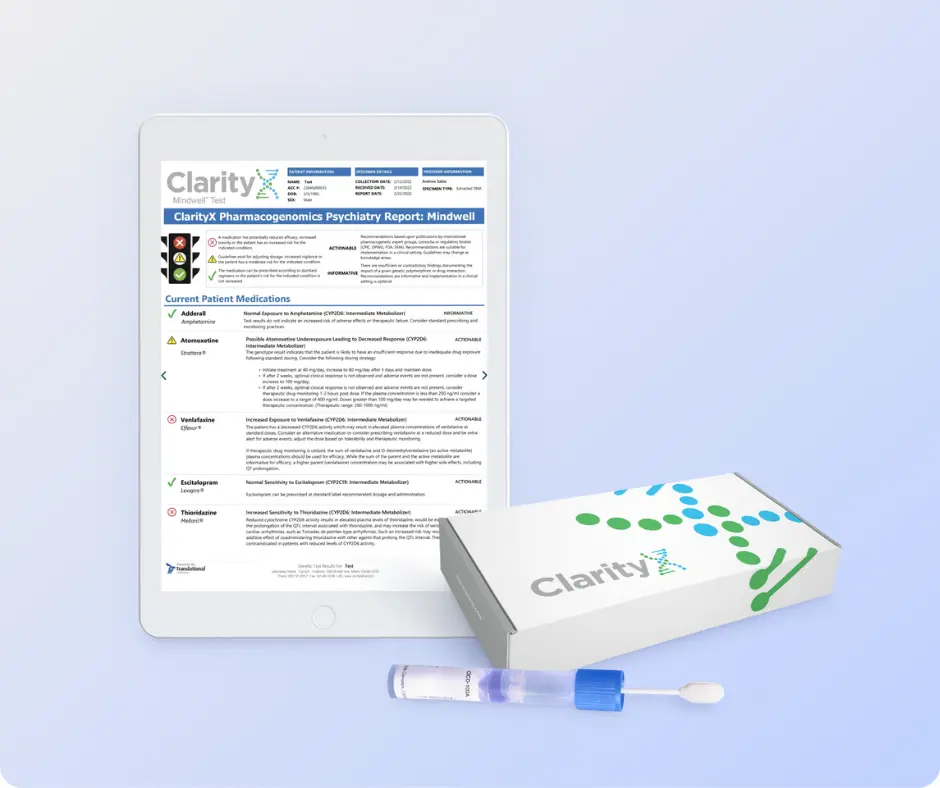People who have been diagnosed with ADHD may use certain anti-ADHD agents such as Concerta or Ritalin to help manage their symptoms. Learn more about each of these medications and how genetic testing for ADHD may help you determine which one is right for you.
Concerta vs Ritalin
Attention deficit hyperactivity disorder (ADHD) affects an estimated 4-5% of US adults and 6 million children, making it one of the most common mental health conditions in the country.1 Medications such as Concerta and Ritalin are anti-ADHD agents that may help people with ADHD manage symptoms related to focus issues, attention, hyperactivity, and impulsivity.
Concerta and Ritalin are both brand name medications for methylphenidate, a central nervous system (CNS) stimulant that may be used as part of a treatment plan for ADHD. Concerta and Ritalin are similar in that they help balance concentrations of norepinephrine and dopamine in the brain. While the two are similar, Concerta and Ritalin are not the same. Understanding the differences between Concerta vs Ritalin may help you and your doctor determine whether Concerta or Ritalin is best for you. Additionally, genetic testing for ADHD medications may help.
Concerta vs Ritalin: What are They?
Concerta and Ritalin are anti-ADHD agents that may be useful for treating ADHD in children, adolescents, and adults. The effectiveness and manner in which each drug interacts with individuals depend on many factors including symptoms, dosage, body chemistry makeup, height, weight, other medications, and more.
What is Concerta?
Methylphenidate (Concerta) is a Schedule II controlled substance that may be used to treat ADHD and narcolepsy, a chronic sleep disorder that is characterized by excessive daytime sleepiness and sudden bouts of falling asleep. Concerta has been approved as an effective treatment medication for ADHD. This CNS stimulant works by modifying the levels of norepinephrine and dopamine, two neurotransmitters, in the brain. Increasing their levels may help improve symptoms of ADHD and help reduce episodes of narcolepsy.
What is Ritalin?
Ritalin is another brand name for methylphenidate. Just like Concerta, Ritalin is a CNS stimulant that is commonly prescribed for ADHD and narcolepsy. Ritalin works by increasing the amount of dopamine that gets released in the striatum region of the brain. This part of the brain is primarily responsible for motivation and cognition.2
Concerta vs Ritalin: Common Side Effects
Bringing a new medication of any kind into your body will almost always come with a risk of side effects. Everyone experiences side effects from medications differently, so it is important to understand the potential risks prior to starting medication. While many mild side effects are normal, genetic testing for ADHD may help prevent adverse reactions to certain medications by helping you find the right one. Read on to learn about some of the most common side effects associated with Concerta and Ritalin.
Side Effects Common with Concerta
Some people who take Concerta may experience the following side effects:
- Increased nervousness
- Anxiety
- Dry mouth
- Trouble sleeping/insomnia
- Loss of appetite
- Weight loss
- Dizziness
- Nausea/vomiting
- Stomach pain
- Sweating
- Headaches
- Empty tablet shell in stool
Side Effects Common with Ritalin
Some people who take Ritalin may experience side effects including, but not limited to:
- Nervousness or irritability
- Trouble sleeping
- Weight loss
- Loss of appetite
- Dry mouth
- Dizziness
- Nausea
- Vomiting
- Headaches
- Excessive sweating
- Fast heart rate
Although uncommon, some men and boys may also experience a prolonged erection for 4+ hours when taking either Concerta or Ritalin. Please consult a healthcare professional if you experience severe side effects from Concerta or Ritalin or if side effects last for more than several weeks.
Concerta and Ritalin are stimulant medications, which means taking them also comes with a high risk of misuse/abuse and dependence. This could be in the form of physical dependence as well as psychological dependence. Please exercise caution when taking these medications, especially if you are prone to substance abuse disorders.
Concerta vs Ritalin: Dosage
How people take Concerta vs Ritalin may differ depending on their treatment plan. Dosage is highly individualized and should always be supervised by a doctor and/or pharmacist.
Concerta Dosage
Always take Concerta exactly as prescribed by your doctor. This medication may be taken with or without food. It is recommended that individuals take Concerta in the morning, as taking it in the evening could interfere with your sleep. Tablets should be swallowed whole and not crushed, chewed, or divided.
Concerta is an anti-ADHD agent that is available as an oral extended-release (ER) tablet in the following strengths: 18 mg, 27 mg, 36 mg, and 54 mg. Most healthcare providers will increase the dosage of Concerta in 18 mg increments at weekly intervals for patients who exhibit the need for a higher dosage. For children, it is not recommended to exceed 54 mg/day of Concerta. For adolescents and adults, it is not recommended to exceed 72 mg/day.3
Ritalin Dosage
Ritalin comes in two forms: Ritalin (Immediate-Release) and Ritalin SR (Sustained-Release). Both immediate-release and sustained-release forms of Ritalin should be taken orally and in the morning. Taking Ritalin too late in the day could lead to sleep issues such as insomnia.
Ritalin is best taken 30 to 45 minutes before a meal, two to three times per day. The initial recommended dosage for immediate-release Ritalin tablets for children is 5 mg 2x/day, once before breakfast and once before lunch. If taking Ritalin before eating causes an upset stomach, you may take it after a meal. Most healthcare professionals will increase the dosage of Ritalin for pediatrics in 5-10mg increments. It is not recommended to exceed 60 mg of Ritalin per day for children.
The starting dosage of Ritalin for adults is typically between 20-30mg to be administered orally 2-3x/day. The maximum recommended dosage of Ritalin for adults is 72 mg/day.4
Ritalin SR should be taken just once per day, always in the morning. The maximum dosage of Ritalin SR should not exceed 60 mg/day.
Concerta vs Ritalin: How Quickly Does It Work?
Because Concerta and Ritalin are stimulant medications, both of them will begin to activate rather quickly upon ingestion. Concerta has an advanced trilayer formulation, which means that the drug’s effects may start to kick in within 1 hour of the tablet’s first layer dissolving.
Ritalin is another fast-acting stimulant, of which the effects typically begin to activate within 20-30 minutes of oral administration.5 Please keep in mind that how quickly a medication works depends on your body’s ability to absorb it. This will vary from person to person.
Concerta vs Ritalin: How Long Does It Last?
The effects of Concerta vs Ritalin may also vary depending on an individual’s genetic makeup, including other medications they are on, height, weight, and several additional factors. The effects of Concerta usually peak within 1 hour of administration, with steady effects continuing for the next 6-10 hours. After this time period, there will be a gradual decrease.
Immediate release Ritalin usually lasts between 3-4 hours; the sustained-release version of Ritalin may last between 6-8 hours.7
It is extremely important to note that the effects of both Concerta and Ritalin may wear off over time and that it is possible to build up a tolerance to these medications. This could lead to misuse, abuse, and dependence (both physically and psychologically). Please exercise extreme caution if you are prone to substance abuse.
Why Take Concerta Vs Ritalin? Or Ritalin vs Concerta?
Although both Concerta and Ritalin are brand names for methylphenidate and are both anti-ADHD agents, one may work better for you than the other. Ritalin is a fast-acting CNS stimulant. While its effects kick in more quickly than those of Concerta, they also wear off faster. Some people experience more abrupt onset and offset symptoms with Ritalin than they do with Concerta, which individuals say tends to yield steadier symptom control over a slightly longer period of time.
Research has found that the effectiveness of both Concerta and Ritalin are relatively similar.8 The main reason to take one vs the other will likely come down to body chemistry, genetics, and lifestyle. ClarityX may be able to help determine which of these anti-ADHD medications will work best for you through pharmacogenetic testing.
Concerta vs Ritalin: Similarities and Differences
ClarityX: DNA Testing for Medication
Our DNA contains valuable information that may inform how we will respond to certain medications and forms of treatment. ClarityX examines DNA to uncover this information and provide patients with detailed reports on how they may react to taking certain drugs. We look for variations with the cytochrome 450 enzymes (which metabolize over 70% of drugs). ClarityX provides pharmacogenetic testing with two options:
- Mindwell test: This focuses on treatments for mental health conditions that include but are not limited to depression, anxiety, ADHD, OCD, and more.
- Max Rx test: This covers 31 therapeutic areas to test how an individual may respond to more than 265 medications.
Both the Mindwell and Max Rx tests may help determine how you will react to Concerta and Ritalin. This could help you and your healthcare provider make more informed decisions about your treatment plan. Click here to learn more.
1https://www.ncbi.nlm.nih.gov/pmc/articles/PMC7916320/
3https://www.drugs.com/dosage/concerta.html
https://www.pdr.net/drug-summary/Ritalin-Ritalin-SR-methylphenidate-hydrochloride-1989.4078
https://www.pdr.net/drug-summary/Ritalin-Ritalin-SR-methylphenidate-hydrochloride-1989.4078
4https://www.pdr.net/drug-summary/Ritalin-Ritalin-SR-methylphenidate-hydrochloride-1989.4078
5https://silverpinestreatmentcenter.com/addiction-blog/how-long-does-it-take-for-ritalin-to-work/
6https://www.accessdata.fda.gov/drugsatfda_docs/label/2017/021121s038lbl.pdf
7http://www.mainlinefamily.com/wp-content/uploads/2012/08/Methylphenidate_Fact_Sheet.pdf





